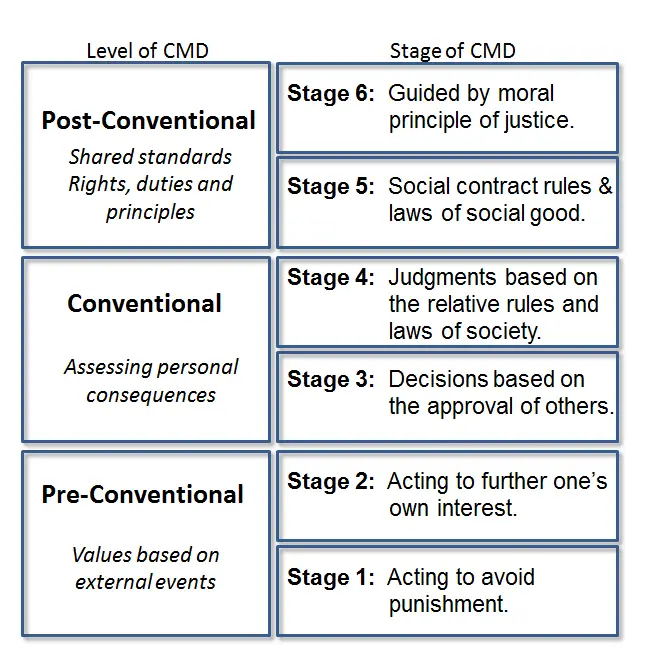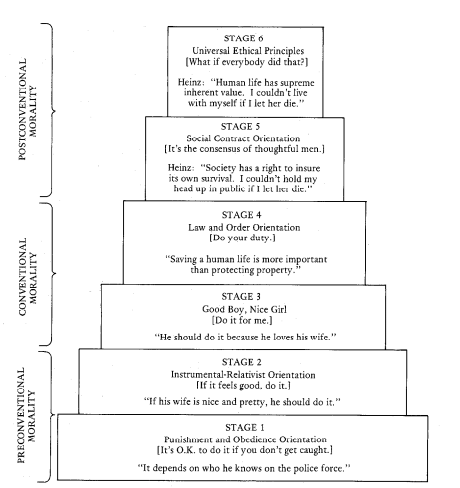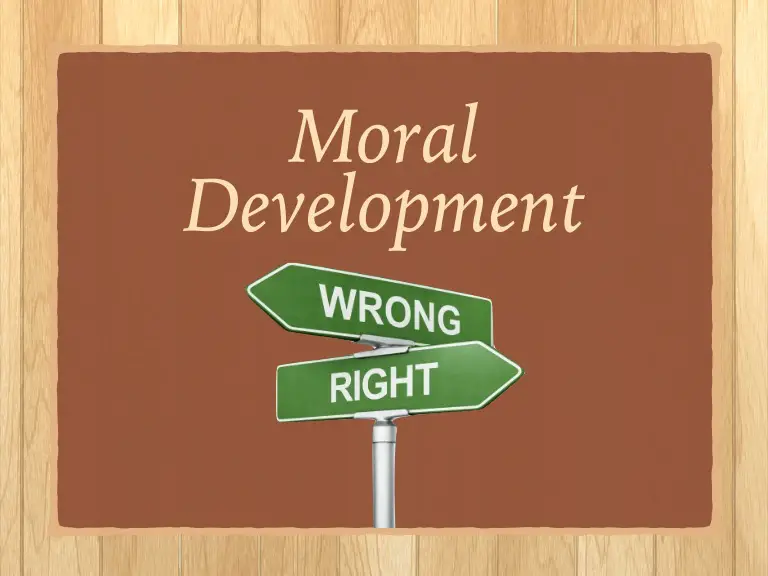Kohlberg 6 Stages of Moral Development | Heinz dilemma Example
Who is Laurence Kohlberg?
Laurence Kohlberg was a famous psychologist born in 1927 in New York. He attended the University of Chicago, where his interest in developmental psychology began. But in graduate school, Kohlberg became interested in a specific type of developmental psychology called moral development.
Kohlberg and Piaget on Stages and Moral Reasoning
Developmental psychology is basically what it sounds like. It’s the study of how the brain develops. Moral development is the type of development in the brain that has to do with how you think about moral issues and what you think is right or wrong.
Another very famous developmental psychologist was named Jean Piaget, and he was Laurence Kolberg’s inspiration and influence.
Jean Piaget was known for his studies and research in a lot of different areas of developmental psychology. One being cognitive development, which has to do with how the brain thinks, perceives, and gains knowledge about the world around it.
Although Jean Piaget didn’t focus his studies and research specifically on moral development as Kolberg did, he did come up with some stages of moral development, which defined how most people at a certain age think about what’s right or wrong.
Piaget said that younger children ages 11 and under believe that rules are absolute things that they must always follow because their teacher or authority says so.
But older kids understand that rules are just devices to help people get along, and they can be changed.
But Lawrence Kohlberg later came up with six much more accurate and specific stages that gave a whole new definition of moral development. Laurence Kohlberg’s theory is known as the stages of moral development.
Kohlberg 6 Stages of Moral Development
Kohlberg believed that decisions that a person made were partly based on their level of moral development.
Expanding upon prior theories, Kohlberg identified three phases of moral development. These three phases each contained two stages making for a total of six stages altogether.
💥🎁 New Year & Easter Deals On Amazon !
Don't miss out on the best discounts and top-rated products available right now!
🛒 Shop Now and Save Big Today!*As an Amazon Associate, I earn from qualifying purchases.
According to Kohlberg, as we mature, we progress through these stages. Although an identical decision can be reached by people occupying different moral development stages, the rationale behind the decision differs.
He also came up with a device to help judge which of his six stages a certain person was age. This device is a story about a couple in Europe called the Heinz Dilemma.
Kohlberg’s Heinz dilemma Example
What is Kohlberg’s Heinz dilemma?
Kohlberg’s Heinz dilemma is also known as the moral dilemma created by Kohlberg, and it discusses the moral question of obeying the law versus saving a life. In Heinz Dilemma story, Kohlberg emphasized that it is how an individual reason about a dilemma that determines positive moral development.
It is as follows Heinz’s Wife was near death from cancer. There was one drug that the doctors thought might save her.
There was only one pharmacist who sold the drugs; since he discovered the drug and was the only person who had it, he decided to charge ten times what the drug cost him to make
For a small dose of the drug, it cost him $200, but he charged Heinze $2000 for that dose.
Heinz didn’t have $2000, so he tried everything he could think of to raise the money, but he could only get together about $1000, which is half of what it cost.
He told the pharmacist that his wife was dying and asked him to sell it to him cheaper or let him pay later. But the pharmacist said No. I discovered the drug, and I’m going to make money from it.
So, Heinz got desperate and broke into the man’s store to steal the drug for his wife.
Should Heinz have broken into the store to steal the drug for his wife? Why or why not?
- Should Hienz steal the drug and not go to prison ?.
- Should Hienz not steal the drugs since he would be breaking the law.
- Should Hienz steal the drug and accept any prison sentence
Lawrence Kohlberg 6 Stages of Moral Development
Kolbert expanded it on developed Piagets theory throughout his life. The theory holds that moral reasoning is the best basis for ethical behavior. By analyzing people’s responses to Heinz’s dilemma, Kohlberg was able to classify people’s moral thinking into one of the six identifiable developmental stages.
The six stages of moral development are grouped into three levels, namely;
- Preconventional Level (Stage 1 and stage 2)
- Conventional Level (stages 3 and stage 4)
- Post-Convention Level (stages 6 and stages 6)
Kohlberg’s scale is about how people justify behaviors, and his stages are not a method of the ranking house someone’s behavior is.
Preconventional level of Moral Development
There’s pre-conventional, which involves Stages one and two.
Stage 1; Obedience and Punishment.
The primary driver behind decision making is avoiding punishment, regardless of how the decision-maker really feels about the issue, so the potential punishment would influence an individual who occupies this stage.
At this stage, children assume that authorities in their life, such as teachers and parents, lay down a set of rules that they must unquestionably follow.
This is when a child with pre-conventional morality has not yet adopted or internalized society’s convention regarding what is right or wrong but instead focuses largely on external consequences that certain actions may bring.
💥🎁 New Year & Easter Deals On Amazon !
Don't miss out on the best discounts and top-rated products available right now!
🛒 Shop Now and Save Big Today!*As an Amazon Associate, I earn from qualifying purchases.
They hardly even realized that viewpoints differ morally. They’re just interested in abiding by the rules to avoid punishment.
Obedience and Punishment Example
For example, California’s 10/ 20 life law was enacted in 1996. This law calls for stricter penalties on individuals who are found in possession of a firearm while committing a crime.
For example, using a gun during a crime but not discharging will tackle an extra ten-year prison sentence.
Discharging a firearm during a crime with no injuries would result in an extra 20 years in prison and discharging a firearm with the resulting injury or fatality. That will get you an additional 25 to life on top of sentences for other crimes.
If the prospect of being punished heavily influenced you and, of course, considering committing a crime, California’s 10/ 20 life law could provide enough of an incentive to leave that firearm at home.
Heinz dilemma Example
So in response to the Heinz dilemma, children with moral thinking at stage one almost always say that Heinz did not do the right thing because stealing is bad; it’s against the law, and you could go to jail. And that reflects what the whole stage is about.
Stage 2; Individualism and Exchange
At Individualism and Exchange stage, the concern is focused more on advancing one’s own position, with less concern for punishment.
The phrase you scratch my back, and I’ll scratch yours best characterizes this Stage as reciprocity plays a significant role.
💥🎁 New Year & Easter Deals On Amazon !
Don't miss out on the best discounts and top-rated products available right now!
🛒 Shop Now and Save Big Today!*As an Amazon Associate, I earn from qualifying purchases.
Despite potentially serving more prison time, someone at this stage of moral development may decide to use a firearm in some capacity while committing a crime if they felt that doing so could advance their own position.
At this stage, children realized that authorities’ rules aren’t the only right point of view. They realized that everybody in life naturally wants their own way of things, and everybody wants to pursue their life in their own different way based on their own self-interests. Punishment is just a risk that everybody wants to avoid.
Individualism and Exchange Examples /Heinz dilemma Example
In response to the Heinz dilemma, children with moral thinking at this stage often think well. What was right for Heinz is what met his self-interests, which means stealing the drug for his wife.
And what was right for the druggist met his self-interests, which means making the drug’s money. They also often point out that the druggist was unfair for charging too much money from the drug.

Conventional Level of Moral Development
Decisions made at the conventional level are driven by societal expectations, meaning that people will look to others to determine acceptable behavior.
Stage 3; Good Interpersonal Relationships.
At this stage, people, not just children anymore, believe that you should live up to family and community values and that you should have trust, empathy, and compassion for one another.
Here, the primary driver behind decision making is what other people are doing. So in this Stage, if your coworkers are using the company credit card for personal use or engaging in some other unethical behavior, then you would be more likely to do the same.
Stage 4; Maintaining the social order.
In this stage, people are oriented towards authority rules and maintaining social order.
💥🎁 New Year & Easter Deals On Amazon !
Don't miss out on the best discounts and top-rated products available right now!
🛒 Shop Now and Save Big Today!*As an Amazon Associate, I earn from qualifying purchases.
People still look towards society to determine how to behave. However, in this case, the established laws, instead of others’ behavior, are the primary drivers.
Here people are concerned with society as a whole. They want the world to function correctly, which means they usually want everybody to abide by rules and laws.
Although they’re essentially taking the same side as Stage one obedience and punishment stage one, children have no grasp for how society works as a whole.
This is when people think it’s important to obey laws and social conventions because of their importance in maintaining a functioning society.
Most active members of society, the average most adults, well hold or remain at the stage for most, if not the majority of their life, where morality is still predominantly dictated by an outside force.
Maintaining the Social Order Example 1
Suppose using the company credit card to pay for your family dinner is against company policy, and it probably is. In that case, you will likely avoid this behavior despite the actions of others.
Maintaining the Social Order Example/Heinz dilemma Example.
In response to the Heinz dilemma, stage four people almost always say that it was wrong for Heinz to steal the drug because what he’s doing is not keeping society functioning, orderly, and properly.
And they also often point out that if everybody stole what they wanted, the world would be in chaos.
💥🎁 New Year & Easter Deals On Amazon !
Don't miss out on the best discounts and top-rated products available right now!
🛒 Shop Now and Save Big Today!*As an Amazon Associate, I earn from qualifying purchases.
Postconventional Level of Moral Development
In the third and final phase of moral development, people make an effort to define their own moral values and principles outside of the law and what society deems appropriate.
This phase is referred to as the post-conventional level of moral development.
Stage 5; Social Contract and Individual Rights
In the fifth stage, the social contract stage, people consider laws like in stage four; however, they also incorporate their own personal values and opinions.
So, the law is really a starting point to decision-making instead of the only factor as in stage four. Outside of the law, social utility or what is in the best interest of society’s members as a whole will be considered when evaluating a particular situation.
Here, people define what a good society means for them. Realizing that there isn’t only one straight answer to the way this society should be. They compare human rights to the law and are very theoretical about the way the world should be.
That’s kind of where the democracy the high functioning democracies fits is with the social contract, knowing that they’re all our laws, but you can always change them.
Social Contract and Individual Rights Example
For example, you may decide that committing a crime like a robbery is morally wrong, not only because it is clearly against the law but also on society members’ rights.
Social Contract and Individual Rights Example/Heinz dilemma Example
When responding to the Heinz dilemma, people from Stage five aren’t usually in favor of breaking the law, but their response is usually come down to saying yes.
💥🎁 New Year & Easter Deals On Amazon !
Don't miss out on the best discounts and top-rated products available right now!
🛒 Shop Now and Save Big Today!*As an Amazon Associate, I earn from qualifying purchases.
It was okay for Heinz to steal the pharmacist’s drug because life is more important than property. Their responses to the Heinz dilemma also often contain many references between society’s way and how they think society should be.
And if that meant breaking the law, so be it.
Stage 6; Universal Principles Stage
The sixth and final stage of moral development is known as the universal principle stage. In this stage, what is determined to be right is based upon individual ethical principles.
These principles tend to be universal principles of justice, reciprocity, equality of human rights, and respect for human beings’ dignity.
It’s very rare for people to live in this realm consistently. It is defined by principled conscience. It involved an individual imagining what they would do in somebody else’s shoes.
As individual persons, you’re probably familiar with the golden rule, another popular universal principle. At this stage, people will maintain behavior consistent with their established principles, regardless of the law or what is best for society.

Kolbert believes that although we progress through these stages in order, not everyone reaches the final stage. Kohlberg argued that only 20% of adults ever reached the post-conventional Stage.
So, where does everyone end up? Well, most adults actually occupy the conventional stage of moral development, which, if you recall, relies on society as a gauge for acceptable behavior.
💥🎁 New Year & Easter Deals On Amazon !
Don't miss out on the best discounts and top-rated products available right now!
🛒 Shop Now and Save Big Today!*As an Amazon Associate, I earn from qualifying purchases.
Although Kolbert insisted that stage six does exist, he also found it difficult to identify individuals who consistently operated at that.
